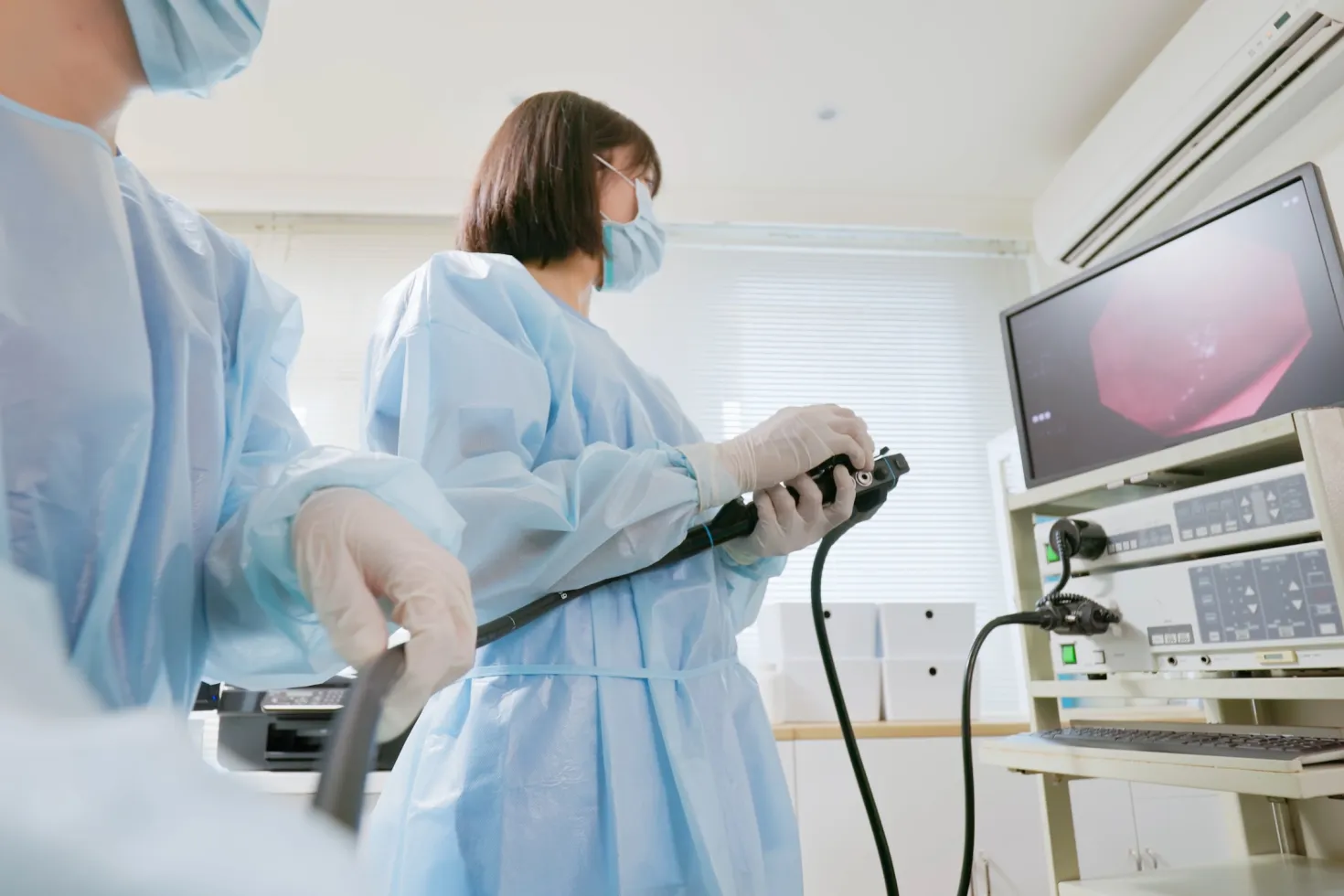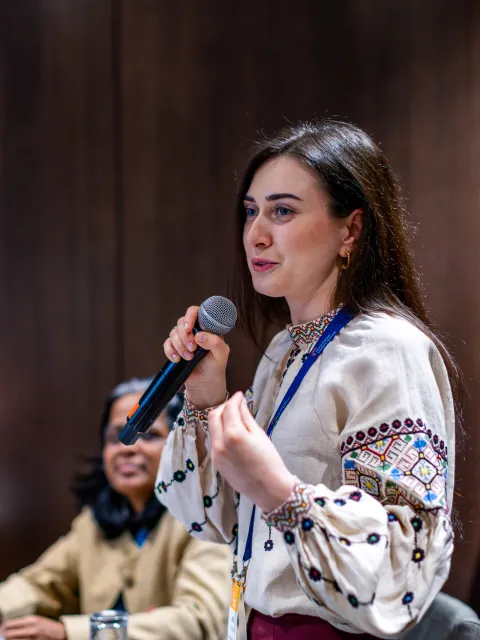The challenges of colorectal cancer: stigma, delayed diagnoses, and rising cases in young adults
While colorectal or bowel cancer is largely preventable through routine screening and early detection, it remains one of deadliest cancers worldwide due to significant challenges in accessing effective services. Nicole Sheahan, President of the Global Colorectal Cancer Association, a UICC member organisation, explains.

"Colorectal cancer screening requires significant investment, but the long-term benefits—preventing late-stage diagnoses and reducing treatment costs—are undeniable." Nicole Sheahan, President of the Global Colorectal Cancer Association, a UICC member organisation
HIGHLIGHTS
- Colorectal cancer is a leading cause of cancer-related deaths globally, but early detection through routine screening can significantly improve survival rates.
- A lack of reliable data in low- and middle-income countries hinders the implementation of effective screening programmes due to governments underestimating the impact of colorectal cancer.
- Stigma, lack of awareness, and systemic barriers prevent many people from accessing available screening and treatment services, while public health messaging and education are needed to normalise discussions around digestive health.
- The rise in early-onset colorectal cancer cases is concerning, and while more research is needed to understand the cause, younger people need to be made aware of signs and symptoms and feel empowered to discuss them with their primary care physicians, who should consider colorectal cancer as a possible cause of symptoms regardless of the patient's age.
Colorectal cancer, also known as bowel cancer, is the third most commonly diagnosed cancer in the world for both men and women (Globocan 2022). It represents over 10% of all cancers in men, after lung and prostate cancers, and just under 9% of all cancers in women after breast and lung cancers.
It is also the second leading cause of cancer-related mortality globally, accounting for just over 9% of all cancer deaths.
Many countries have seen significant progress in improving survival rates, thanks to routine screening that can detect colorectal cancer at an early, even pre-cancerous stage. For many individuals, however, often the most vulnerable, access to lifesaving colorectal cancer services for early detection, diagnosis, and treatment is riddled with challenges, even in countries where are available. Furthermore, there is a global trend in the rising number of young adults being diagnosed with colorectal cancer.
As Colorectal Cancer Awareness Month comes to a close, UICC speaks with Nicole Sheahan, President of the Global Colorectal Cancer Association, a UICC member organisation, to discuss the inequities in prevention, screening, and treatment, the barriers to affordable access due to lack of awareness, stigma, socioeconomic and other systemic barriers, and what can be done to ensure that all populations receive the care they need.
What would you say is a key issue in advocating for accessible and affordable colorectal cancer services?
The disparities in colorectal cancer care are massive, but my immediate response would be the lack of reliable data. Many low- and middle-income countries (LMICs) have no formal screening programmes, so colorectal cancer diagnoses often go undocumented and the related deaths are not put down to cancer. Furthermore, people frequently travel from rural areas to cities for treatment, making it appear as though the disease disproportionately affects urban populations, leading to late diagnoses and poor survival rates.
How does this lack of data affect the implementation of screening programmes?
Colorectal cancer screening requires significant investment, but the long-term benefits—preventing late-stage diagnoses and reducing treatment costs—are undeniable. Yet, without accurate and solid data, governments may underestimate the extent of how colorectal cancer affects their populations, and advocates struggle to make the case for national screening programmes.
What are some of the biggest barriers to accessing screening and treatment services?
There are several. First, in many places, screening simply isn’t available. In some LMICs, even private-pay options are limited, and doctors will generally prioritise patients with symptoms over asymptomatic individuals seeking preventive screening. Second, in countries where screening is accessible, awareness is still a major issue. Many people don’t know that routine screening can catch pre-cancerous polyps before they become life-threatening.
But it’s also essential to address the problem of stigma. Colorectal cancer isn’t an easy topic to discuss, and many people avoid it out of embarrassment or fear. Even in countries with relatively low barriers to screening, such as the US, about a third of eligible individuals still do not participate, and this is partially due to stigma and lack of knowledge.
What can be done to reduce stigma and increasing awareness?
Most people don’t know what’s normal when it comes to their bowel habits. Rectal bleeding, chronic constipation, or persistent changes in stool consistency should never be ignored, yet many people rationalise these symptoms for years.
We need public health messaging that normalises discussions around digestive health and makes people more comfortable seeking care. Using social media tools and even pop culture references, such as the poop emoji, to spark conversations can help break the silence.
This is really important, particularly in empowering people, notably young adults, when speaking with their doctor. Even when patients express concerns, they are sometimes dismissed. This is especially alarming given the rise in early-onset colorectal cancer.
Why are we seeing a significant rise in colorectal cancers among young adults, even in their 20s, and how should screening guidelines adapt?
The increase in colorectal cancer among younger populations is deeply concerning. Traditionally, screening started at age 50, but in the US, it has been lowered to 45 due to growing evidence of early-age cases. Yet, many patients in their 20s and 30s report being dismissed by their doctors when they bring up symptoms. There’s also debate over whether universal screening should be lowered further, but from a public health perspective, it must be a financially viable approach. At the very least, we need to ensure that people presenting with symptoms are taken seriously and tested promptly.
What can be done to improve the early detection of colorectal cancer in young adults without taking steps that are financially ruinous for a health system, such as widespread screening for everyone?
Primary care doctors are a key touchpoint, making them aware of this rise in cases and to not dismiss symptoms out of hand, perhaps refer first for stool-based testing. But so are other healthcare professionals. Pharmacists, for example, are often the first to see patients dealing with gastrointestinal symptoms such as chronic constipation or rectal bleeding. If pharmacists were better integrated into colorectal cancer awareness efforts, they could encourage high-risk individuals to seek medical evaluation. Education needs to extend beyond doctors’ offices – into pharmacies, gynaecologists’ practices, and even workplaces.
How do we ensure that health systems are more responsive to patient needs, especially for colorectal cancer?
Healthcare providers are stretched thin worldwide, so we must rethink how we integrate people-centred care. Nurses, pharmacists, and other healthcare professionals need to be empowered to take a more active role in prevention and education. Additionally, we need to address disparities in treatment access. Targeted therapies, for example, have revolutionised colorectal cancer care, but they remain expensive and inaccessible in many parts of the world. If we want to improve outcomes, we must advocate for both early detection and equitable access to life-saving treatments.
Are there any promising research efforts that could help explain the rise in early-onset cases?
The microbiome is a leading area of study, with researchers looking at links between colorectal cancer and factors like early antibiotic use, diet, environmental toxins, and even C-section births. While no single cause has been identified, the urgency of research cannot be overstated.
Unfortunately, funding for cancer research is under threat in some countries, including the US. This could slow down critical discoveries that might explain – and eventually help prevent – the rising incidence of early-onset colorectal cancer.
As Colorectal Cancer Awareness Month comes to a close, can you provide some background on its origins and objectives?
Colorectal Cancer Awareness Month was first officially recognised in the U.S. in 2000, around the time when the Colorectal Cancer Alliance was founded. The Global Colon Cancer Association (GCCA) emerged from that movement as a separate non-profit in 2012. While March is widely recognised as the awareness month, some countries observe it in April or even June, which can make it difficult to unify a global campaign.
Our primary initiative is Blue Hat Bow Tie, which was created in 2010 by Candace Henley, a colorectal cancer survivor who decided with her family to wear blue hats to church to raise awareness about the disease. Candace founded the Blue Hat Foundation and developed a faith-based outreach programme for underserved US communities.
In 2023, the Global Colon Cancer Assocation then partnered with the Blue Hat Foundation and taken the movement global.
Finally, what’s a key message you want to leave with readers?
Colorectal cancer is largely preventable, yet where you live often determines whether you can access life-saving screenings and treatments. We need to break down barriers – whether they are financial, logistical, or rooted in stigma – to ensure that everyone has the chance to prevent and survive this disease. No one should be denied care because of their age, location, or background. We must continue pushing for equitable access to colorectal cancer services worldwide.
Last update
Wednesday 26 March 2025




